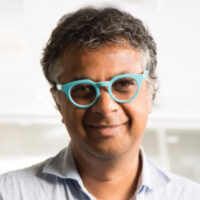
Date: February 29, 2024
Time: 12:30 p.m. - 1:30 p.m.
Location: Maeder Hall Auditorium
Fragmentation Concepts Explain Nanoplastic Formation and Temporal Persistence
Sanat Kumar
Bykhovsky Professor of Chemical Engineering, Columbia University
Abstract:
Roughly 85% of all polymers are not recycled – much of this waste plastic ends up in the environment. Many wear mechanisms – light, stresses, weathering – lead these materials to form nanoplastics which could have deleterious consequences on human and animal health. We study the mechanism of nanoplastic formation in two canonical cases – rubber tires and semicrystalline polymers, which comprise more than 75% of all polymers we use. We show that while nanoplastic formation in the two cases have very different mechanisms, that they are unified by the concept of fragmentation. Both experimental and theoretical aspects of these situations are touched on, and we shall examine mitigation strategies.
Bio:
Kumar creates, analyzes, and models new classes of polymer-based materials with improved properties. A particular focus is on hybrid materials (polymer with inorganic filler) with relevance to biomimicry, and energy storage and conversion. His group has been the pioneer over the last decade in the practically relevant topic of Polymer Nanocomposites where inorganic nanoparticles are added to polymers to obtain materials with synergistic properties. A central problem in this area is that the inorganic, hydrophilic nanoparticles are frequently immiscible (organic) polymers – thus the promised property improvements from these materials have remained hard to realize. Thus, many industrial applications use predefined “recipes” to make products, with spectacular failures, such as tire tread separation that happened some time ago, being the consequence of our poor understanding of these systems and therefore their properties.
His work in this area spans all topics of polymer nanocomposites including self-assembly, microstructure, glassy segmental dynamics and vitrification, elasticity and reinforcement, linear and nonlinear mechanical-dynamical phenomena (such as strain softening and yielding), chain relaxation, and nanoparticle diffusion and dynamics. The work in this group combines theory, simulation, and experiment to advance the science of energy conversion and storage (membranes for gas separation and for the selective transport of ions as relevant to batteries) and more recently to mimic biology (e.g., the development of hierarchical morphologies as found in Nacre with the goal of achieving unprecedented improvements in properties and the use of DNA to guide the assembly of nanoparticle into desired structures).
Kumar received a BTech in chemical engineering from the Indian Institute of Technology, Madras in 1981 and a ScD in chemical engineering from the Massachusetts Institute of Technology in 1987. He joined the faculty of Columbia Engineering in 2006.
All seminars are held from 12:30 p.m. to 1:30 p.m.
Lunch is provided at 12:00 noon.
Visit acee.princeton.edu/highlight-seminar-series for more info.